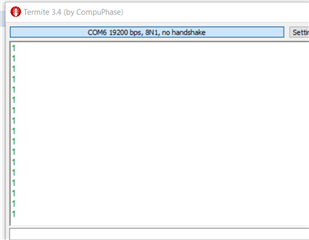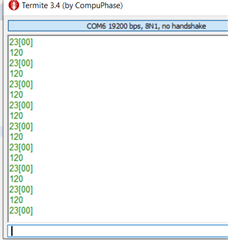请注意,本文内容源自机器翻译,可能存在语法或其它翻译错误,仅供参考。如需获取准确内容,请参阅链接中的英语原文或自行翻译。
部件号:MSP430FR5994 我已经根据 UART教程中使用的代码为UART发射器编写了一些代码。 在我的代码中,发送器将两个输入转换为字符串,然后通过UART将两个输入转换为计算机上的UART终端。
在我的代码中,我将发送值“120”和“23”。 不过,我只是从终端收到“1”,这是这样的。

我的代码,如下所示。
#include <msp430.h>
#include <stdio.h>
int i = 120;
int j = 23;
char message1[3];
char message2[3];
unsigned char TXbytes_A = 0;
unsigned char TXbytes_B = 0;
int main(void)
{
WDTCTL = WDTPW | WDTHOLD; // Stop Watchdog
// Configure GPIO
P2SEL0 &= ~(BIT0 | BIT1);
P2SEL1 |= (BIT0 | BIT1); // USCI_A0 UART operation (p93_s)
// Disable the GPIO power-on default high-impedance mode to activate
// previously configured port settings
PM5CTL0 &= ~LOCKLPM5;
// Startup clock system with max DCO setting ~8MHz
CSCTL0_H = CSKEY_H; // Unlock CS registers
CSCTL1 = DCOFSEL_3 | DCORSEL; // Set DCO to 8MHz
CSCTL2 = SELA__VLOCLK | SELS__DCOCLK | SELM__DCOCLK;
CSCTL3 = DIVA__1 | DIVS__1 | DIVM__1; // Set all dividers
CSCTL0_H = 0; // Lock CS registers
// Configure USCI_A0 for UART mode
UCA0CTLW0 = UCSWRST; // Put eUSCI in reset (p788)
UCA0CTLW0 |= UCSSEL__SMCLK; // CLK = SMCLK
// Baud Rate calculation for 19200
// 8000000/(16*19200) = 26.042
// Fractional portion = 0.042
// User's Guide Table 21-4: UCBRSx = 0xD6
// UCBRFx = int ( (52.083-52)*16) = 1
UCA0BRW = 26; // 8000000/16/19200, p789
UCA0MCTLW |= UCOS16 | UCBRF_1 | 0xD600; // UCOS16 = Oversampling enable, used when high frequency clk is used, probably divides everything by 16, UCBRF = fine turner when UCOS16 is active
// 0xD600 is for first 8 bits,
UCA0CTLW0 &= ~UCSWRST; // Initialize eUSCI
UCA0IE |= UCRXIE; // Enable USCI_A0 RX interrupt
while(1){
__delay_cycles(200000);
UCA0IE |= UCTXIE;
//i++;
__bis_SR_register(LPM3_bits | GIE); // Enter LPM3, interrupts enabled
__no_operation(); // For debugger
}
}
#if defined(__TI_COMPILER_VERSION__) || defined(__IAR_SYSTEMS_ICC__)
#pragma vector=EUSCI_A0_VECTOR
__interrupt void USCI_A0_ISR(void)
#elif defined(__GNUC__)
void __attribute__ ((interrupt(EUSCI_A0_VECTOR))) USCI_A0_ISR (void)
#else
#error Compiler not supported!
#endif
{
switch(__even_in_range(UCA0IV,USCI_UART_UCTXCPTIFG))
{
case USCI_NONE: break;
case USCI_UART_UCRXIFG:
break;
case USCI_UART_UCTXIFG: //TXIFG = transmission flag, needs manual activation
sprintf(message1, "%d", i);
sprintf(message2, "%d", j);
// Transmit the byte
// UCA0TXBUF is taking char message.
for(TXbytes_A = 0; TXbytes_A < 3; TXbytes_A++){
UCA0TXBUF = message1[TXbytes_A]; //TXBUF = Transmit Buffer, p791
}
// If last byte sent, start sending next message
if(TXbytes_A == 3)
{
UCA0TXBUF = 13; //Next line, see ASCII chart
}
for(TXbytes_B = 0; TXbytes_B < 3; TXbytes_B++){
UCA0TXBUF = message2[TXbytes_B]; //TXBUF = Transmit Buffer, p791
}
if(TXbytes_B == 3)
{
UCA0TXBUF = 13; //Next line
UCA0IE &= ~UCTXIE;
}
__bic_SR_register_on_exit(LPM3_bits);
break;
case USCI_UART_UCSTTIFG: break;
case USCI_UART_UCTXCPTIFG: break;
default: break;
}
}
但是,当我在包含中断的线路78和88的for循环中放置相当大的延迟时,我能够接收到整套值。 如下所示:
#include <msp430.h>
#include <stdio.h>
int i = 120;
int j = 23;
char message1[3];
char message2[3];
unsigned char TXbytes_A = 0;
unsigned char TXbytes_B = 0;
int main(void)
{
WDTCTL = WDTPW | WDTHOLD; // Stop Watchdog
// Configure GPIO
P2SEL0 &= ~(BIT0 | BIT1);
P2SEL1 |= (BIT0 | BIT1); // USCI_A0 UART operation (p93_s)
// Disable the GPIO power-on default high-impedance mode to activate
// previously configured port settings
PM5CTL0 &= ~LOCKLPM5;
// Startup clock system with max DCO setting ~8MHz
CSCTL0_H = CSKEY_H; // Unlock CS registers
CSCTL1 = DCOFSEL_3 | DCORSEL; // Set DCO to 8MHz
CSCTL2 = SELA__VLOCLK | SELS__DCOCLK | SELM__DCOCLK;
CSCTL3 = DIVA__1 | DIVS__1 | DIVM__1; // Set all dividers
CSCTL0_H = 0; // Lock CS registers
// Configure USCI_A0 for UART mode
UCA0CTLW0 = UCSWRST; // Put eUSCI in reset (p788)
UCA0CTLW0 |= UCSSEL__SMCLK; // CLK = SMCLK
// Baud Rate calculation for 19200
// 8000000/(16*19200) = 26.042
// Fractional portion = 0.042
// User's Guide Table 21-4: UCBRSx = 0xD6
// UCBRFx = int ( (52.083-52)*16) = 1
UCA0BRW = 26; // 8000000/16/19200, p789
UCA0MCTLW |= UCOS16 | UCBRF_1 | 0xD600; // UCOS16 = Oversampling enable, used when high frequency clk is used, probably divides everything by 16, UCBRF = fine turner when UCOS16 is active
// 0xD600 is for first 8 bits,
UCA0CTLW0 &= ~UCSWRST; // Initialize eUSCI
UCA0IE |= UCRXIE; // Enable USCI_A0 RX interrupt
while(1){
__delay_cycles(200000);
UCA0IE |= UCTXIE;
//i++;
__bis_SR_register(LPM3_bits | GIE); // Enter LPM3, interrupts enabled
__no_operation(); // For debugger
}
}
#if defined(__TI_COMPILER_VERSION__) || defined(__IAR_SYSTEMS_ICC__)
#pragma vector=EUSCI_A0_VECTOR
__interrupt void USCI_A0_ISR(void)
#elif defined(__GNUC__)
void __attribute__ ((interrupt(EUSCI_A0_VECTOR))) USCI_A0_ISR (void)
#else
#error Compiler not supported!
#endif
{
switch(__even_in_range(UCA0IV,USCI_UART_UCTXCPTIFG))
{
case USCI_NONE: break;
case USCI_UART_UCRXIFG:
break;
case USCI_UART_UCTXIFG: //TXIFG = transmission flag, needs manual activation
sprintf(message1, "%d", i);
sprintf(message2, "%d", j);
// Transmit the byte
// UCA0TXBUF is taking char message.
for(TXbytes_A = 0; TXbytes_A < 3; TXbytes_A++){
UCA0TXBUF = message1[TXbytes_A]; //TXBUF = Transmit Buffer, p791
__delay_cycles(10000);
}
// If last byte sent, start sending next message
if(TXbytes_A == 3)
{
UCA0TXBUF = 13; //Next line, see ASCII chart
}
for(TXbytes_B = 0; TXbytes_B < 3; TXbytes_B++){
UCA0TXBUF = message2[TXbytes_B]; //TXBUF = Transmit Buffer, p791
__delay_cycles(10000);
}
if(TXbytes_B == 3)
{
UCA0TXBUF = 13; //Next line
UCA0IE &= ~UCTXIE;
}
__bic_SR_register_on_exit(LPM3_bits);
break;
case USCI_UART_UCSTTIFG: break;
case USCI_UART_UCTXCPTIFG: break;
default: break;
}
}
有了这个代码,包括延迟,我就能收到这个。

我很想最终处理空数组值,但这完全是另一个问题。 如果需要更多信息,请告诉我。 如果能就如何修改我的守则提出具体建议,我将不胜感激。
